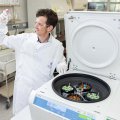Work by a University of Queensland researcher will make the trip to the doctor for a prostate cancer check a lot more appealing for men.
Associate Professor Frank Gardiner, from UQ’s School of Medicine, is developing a more precise and less invasive procedure for prostate cancer detection by retrieving prostate cells from ejaculate.
This project is designed to optimise retrieval of the cells and to compare two methods for profiling selected genetic changes to diagnose prostate cancer.
The work has been given a boost by the announcement today by the Minister for Health and Ageing, Tony Abbott, of more than $100,000 in funding for the project through the National Health and Medical Research Council’s Development Grants Scheme.
Associate Professor Gardiner was one of three UQ researchers who will share in around $280,000 of funding aimed at encouraging research with commercial potential.
Other UQ projects include Professor Istvan Toth, from UQ’s School of Molecular and Microbial Sciences, who will receive $99,750 to look at gene therapy to cure choroidal neovascularisation, which is the most severe form of age related macular degeneration and is the major cause of blindness in the developed world.
Dr Keith Mitchelson, from the Australian Genome Research Facility at UQ, will receive $79,750 to work on new sequencing technology for recalcitrant and repetitive DNA. Many repetitive regions of genomes are difficult to sequence and to assemble but `Sequencing Aided by Mutation` (SAM) overcomes many of the difficulties that hinder current sequencing methods.
Professor David Siddle, UQ’s Deputy Vice-Chancellor (Research), said the funding would help these unique and novel research projects get a step closer to commercialisation.
“All of these UQ projects are extremely promising both in terms of excellence in research and in terms of commercialisation,” Professor Siddle said.
Fourteen leading medical research teams across the country were granted $2 million by the NHMRC scheme to advance their medical research projects.
The nature and risks associated with scientific research commercialisation often makes it difficult to secure finance for early stage research.
The development scheme provides financial support in the early “proof of concept” stage allowing researchers to translate the results of their research into products that will ultimately benefit Australia and the world.
Media: For more information contact Andrew Dunne at UQ Communications (telephone 07 3365 2802).



